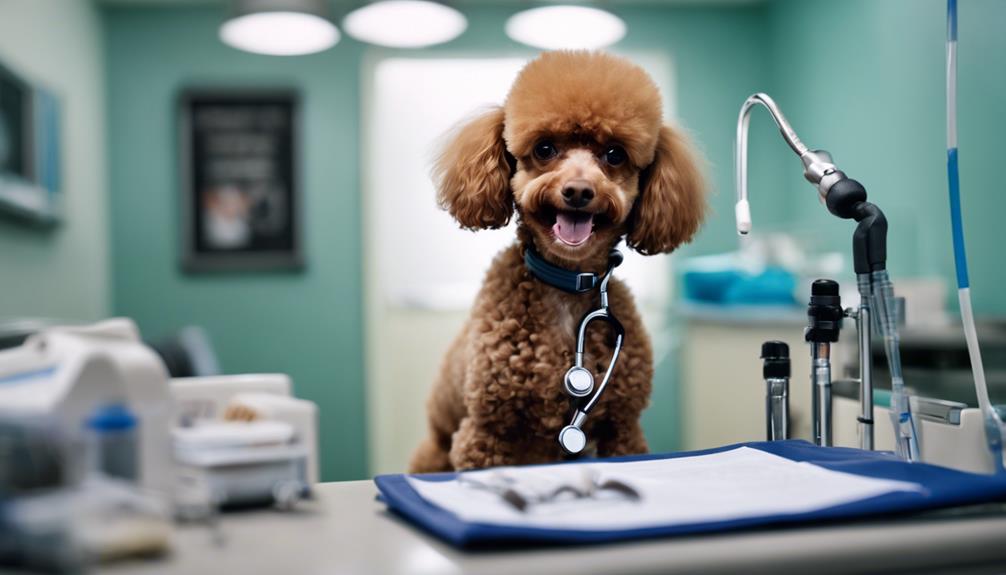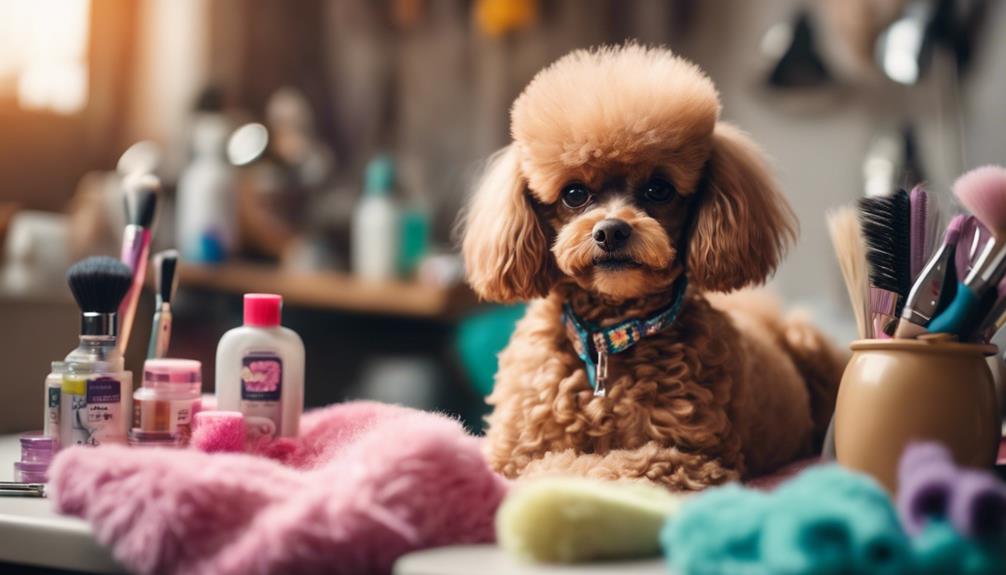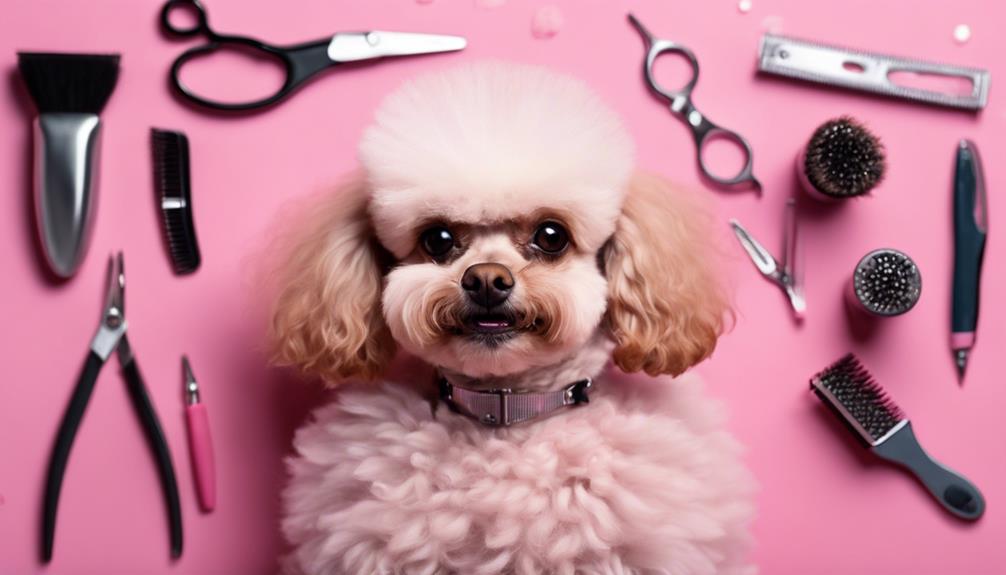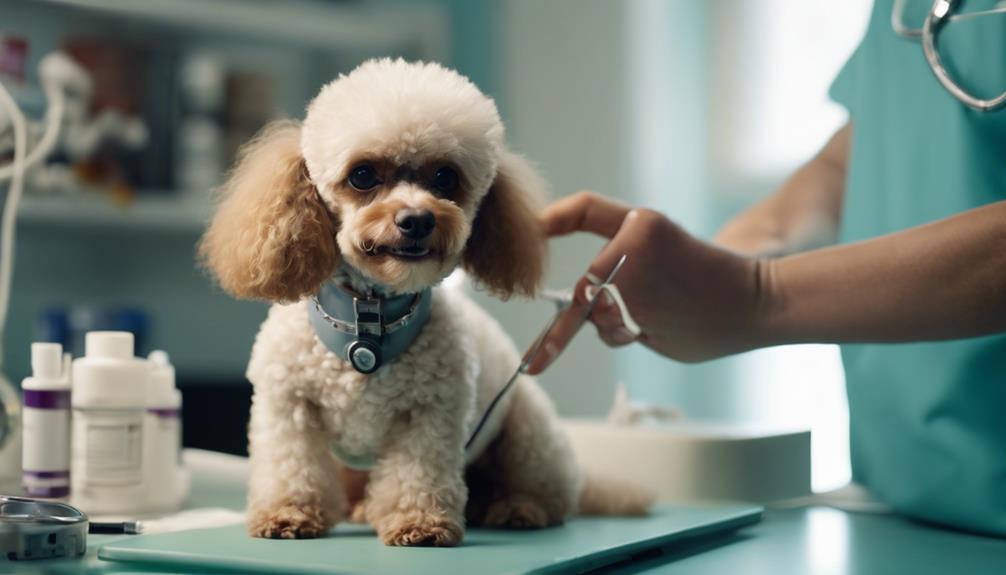When it comes to Teacup Poodles, peeling back the layers to reveal the truth behind their care and needs is akin to untangling a knotted leash. Understanding the intricacies of caring for these pint-sized companions goes beyond just their charming appearance. There's a maze of misconceptions to navigate, and shedding light on the myths surrounding these petite pups is just the beginning. Stay tuned to uncover the secrets to providing optimal care for these little bundles of fluff.
Key Takeaways
- Reputable breeders focus on miniature stature for healthier Teacup Poodles.
- Regular vet check-ups and proactive care are vital for their well-being.
- Balanced diet, exercise, and grooming are essential for overall health.
- Genetic testing and responsible breeding practices help minimize common health issues.
Reality Behind Teacup Poodles

When delving into the reality behind Teacup Poodles, it becomes evident that their diminutive size is a product of intentional breeding practices rather than natural occurrence. Reputable breeders selectively breed these tiny dogs to achieve a small size, typically standing at 9 inches or less and weighing around 6 pounds. While their petite stature may seem endearing, it's crucial to understand that this size is not without consequences. Teacup Poodles are prone to health issues such as dental disease, eye problems, and hypoglycemia due to their small size.
Responsible ownership of Teacup Poodles involves being aware of these potential health risks and providing the necessary care. Regular vet check-ups are essential to monitor their health closely and address any issues promptly. Understanding the breeding practices behind Teacup Poodles allows for informed decision-making when considering adding one to your family. By being informed about their unique needs and challenges, you can ensure that your Teacup Poodle leads a healthy and happy life.
Health Considerations for Teacup Poodles

Health considerations for Teacup Poodles encompass a range of potential issues that owners need to be vigilant about to ensure the well-being of these petite dogs. When caring for your Teacup Poodle, it's essential to be aware of the following:
- Health concerns: Teacup Poodles are prone to various health issues such as dental disease, eye problems, collapsed trachea, GI issues, allergies, hypoglycemia, and heart disease. Regular veterinary check-ups are crucial for early detection and treatment of these conditions.
- Genetic disorders: Due to their small size and selective breeding for miniature stature, Teacup Poodles can be predisposed to genetic disorders. Ensuring that reputable breeders conduct genetic testing can help minimize the risk of inherited health problems.
- Reputable breeders: Choosing a responsible breeder who prioritizes the health and well-being of their dogs is paramount. Reputable breeders will follow ethical breeding practices to produce healthier Teacup Poodles.
- Small size impact: The small size of Teacup Poodles can affect their overall health and lifespan. Understanding the specific care needs associated with their petite stature is essential for providing optimal care.
Understanding Teacup Poodle Care

To properly care for your Teacup Poodle, it is crucial to understand their grooming needs, health concerns, and dietary and exercise requirements. Regular grooming sessions will help maintain their coat and skin health, while monitoring for potential health issues is essential due to their small size. Providing a balanced diet and suitable exercise will contribute to your Teacup Poodle's overall well-being and happiness.
Grooming Needs Overview
Regular brushing is crucial for maintaining the curly, non-shedding coat of Teacup Poodles to prevent matting and tangling. To ensure your Teacup Poodle's coat health and overall well-being, consider the following grooming needs:
- Regular Professional Grooming: Teacup Poodles benefit from a professional grooming session every 4-6 weeks to maintain their distinctive haircut and coat health.
- Frequent Grooming Sessions: Their hypoallergenic fur requires frequent grooming to keep it clean, free of debris, and tangles.
- Prevention of Skin Issues: Regular grooming helps prevent skin problems and maintains the iconic Poodle appearance.
- Specific Care and Attention: Understanding the unique grooming needs of Teacup Poodles is essential to uphold their distinctive coat characteristics.
Health Concerns to Monitor
With a Teacup Poodle, vigilance over dental and eye care is paramount due to their small size and susceptibility to related issues. Regular check-ups are crucial to catch any dental issues early on. Additionally, keeping an eye out for eye problems like cataracts and progressive retinal atrophy is essential. Teacup Poodles are prone to a collapsed trachea, which can lead to breathing difficulties. Monitoring their respiratory health is vital. GI issues such as gastritis and pancreatitis are common in Teacup Poodles, necessitating a specialized diet and close attention to their digestive well-being. Look out for signs of allergies too, as Teacup Poodles can develop skin irritation or gastrointestinal disturbances.
| Health Concerns | Description |
|---|---|
| Dental Issues | Regular check-ups are essential due to small size |
| Eye Problems | Watch for cataracts and retinal atrophy |
| Collapsed Trachea | Monitor breathing for any signs of this condition |
| GI Issues | Specialized diet and monitoring for gastritis & pancreatitis |
| Allergies | Be vigilant for signs of skin irritation or GI upset |
Exercise and Diet
Ensuring proper exercise and a balanced diet are fundamental aspects of caring for Teacup Poodles to maintain their health and well-being. Teacup Poodles require about 1 hour of daily exercise to stay healthy and maintain their weight. Their exercise needs can be met through short walks, play sessions, and interactive toys indoors. Adequate physical activity helps prevent obesity and promotes mental stimulation in Teacup Poodles. A balanced diet tailored to their small size and energy requirements is essential for Teacup Poodle health. Monitoring food intake and providing nutritious meals contribute to the overall well-being of Teacup Poodles.
Debunking Teacup Poodle Myths

To dispel common misconceptions surrounding Teacup Poodles, it's essential to understand their origins and characteristics as a petite variant of Toy Poodles. Teacup Poodles are not a distinct breed but rather a downsized version of Toy Poodles bred for their small stature. The term 'Teacup' is not officially recognized in breed standards but is colloquially used to refer to these tiny Poodles. Despite their adorable appearance, Teacup Poodles face health risks due to their size, including dental issues, heart problems, and fragility. Responsible ownership of Teacup Poodles entails being aware of their specific care requirements and potential health concerns. Misconceptions about these pint-sized pups can lead to unrealistic expectations and challenges in providing adequate care. By understanding the realities of Teacup Poodles and debunking myths, you can ensure a happier and healthier life for these petite companions.
Tips for Caring for Teacup Poodles

To properly care for Teacup Poodles, ensuring their health and well-being, it is essential to prioritize regular vet check-ups and tailor their diet to meet their specific nutritional needs. Teacup Poodles require delicate handling and attention to detail due to their small size and fragile nature. Here are some tips for responsible care of these precious pets:
- Regular Vet Check-ups: Schedule frequent visits to the veterinarian to monitor your Teacup Poodle's health and address any potential issues promptly.
- Specialized Diet: Provide a balanced diet customized for Teacup Poodles to support their unique nutritional requirements and maintain optimal health.
- Gentle Handling: Due to their fragility, handle Teacup Poodles with care and gentleness to prevent any accidental injuries.
- Appropriate Exercise: Engage your Teacup Poodle in light, suitable exercises to keep them active without straining their tiny frames.
Importance of Teacup Poodle Health

Taking proactive steps to maintain your Teacup Poodle's health is vital. By being aware of common health issues like dental disease, eye problems, and hypoglycemia, you can better care for your furry companion. Regular vet check-ups are crucial in detecting and addressing any health concerns early on to ensure your Teacup Poodle lives a healthy and happy life.
Health Maintenance Tips
Regular veterinary check-ups play a vital role in monitoring the health of your Teacup Poodle, ensuring early detection and management of potential issues. To maintain your Teacup Poodle's health effectively, consider the following tips:
- Dental Care: Brush your Teacup Poodle's teeth regularly and provide dental treats to promote good oral health.
- Eye Examinations: Schedule regular eye check-ups with a veterinarian to detect and address any eye problems early on.
- Balanced Diet: Feed your Teacup Poodle a high-quality, balanced diet to support overall health and prevent GI issues.
- Heart Health: Be mindful of heart disease risks in Teacup Poodles; consult your vet for advice on monitoring and maintaining heart health.
Common Health Issues
When considering the health of your Teacup Poodle, it is important to be aware of the common health issues they are prone to due to their small size. Teacup Poodles, because of their petite stature, are at risk for various health issues such as dental disease, eye problems, collapsed trachea, GI issues, allergies, hypoglycemia, and heart disease. Responsible breeding practices, including genetic testing, play a significant role in minimizing these health concerns. It's crucial to understand that the size of Teacup Poodles can impact their overall well-being, making regular vet check-ups essential for early detection and proactive management of any potential health issues. By staying informed about these common health issues and ensuring proper care, you can help your Teacup Poodle lead a healthy and fulfilling life.
Vet Check-Up Importance
To safeguard the health and well-being of your Teacup Poodle, prioritizing regular veterinary check-ups is paramount in detecting and addressing any potential health issues proactively. Here are some key reasons why vet check-ups are essential for the health of your teacup Poodle:
- Early Detection: Regular veterinary visits help catch any health problems early on.
- Preventive Care: Vet check-ups enable proactive measures to prevent potential health issues.
- Tailored Guidance: Veterinarians can offer personalized advice and care plans for your teacup Poodle's specific needs.
- Prompt Treatment: Timely veterinary examinations allow for swift intervention in case of any health concerns.
Ensuring consistent veterinary check-ups is crucial for promoting the well-being and longevity of your beloved teacup Poodle.
Frequently Asked Questions
Do Teacup Poodles Have Health Issues?
Teacup poodles face various health concerns due to their size. Breeding practices impact their well-being, affecting lifespan. Nutrition and exercise are vital. Regular vet visits help manage issues promptly. Ensure responsible breeding to promote their health.
Are Teacup Poodles Hard to Take Care Of?
Taking care of Teacup Poodles requires dedication and attention to detail. Grooming, training, exercise, nutrition, and socialization are all essential aspects to consider. With proper care, these petite pups can thrive and bring joy to your life.
What Is the Truth About Teacup Dogs?
When it comes to teacup dogs, like Teacup Poodles, the truth involves size concerns due to their tiny stature, potential health risks impacting lifespan, specific nutritional needs, essential exercise requirements, and the breeding practices that contribute to their miniature size.
What Are the Cons of Teacup Poodles?
When considering teacup poodles, remember their size concerns may lead to health issues. They have shorter lifespans due to breeding practices. Feeding challenges, exercise limitations, and potential behavioral issues make them high-maintenance pets.
Conclusion
So, next time you hear someone say that Teacup Poodles are just like any other small dog, you can confidently debunk that myth. Remember, these pint-sized pups require special care and attention to thrive. By understanding their unique needs and taking proactive steps to ensure their health and happiness, you can truly experience the joy of owning a Teacup Poodle – they may be small, but their love is as big as the sky!
